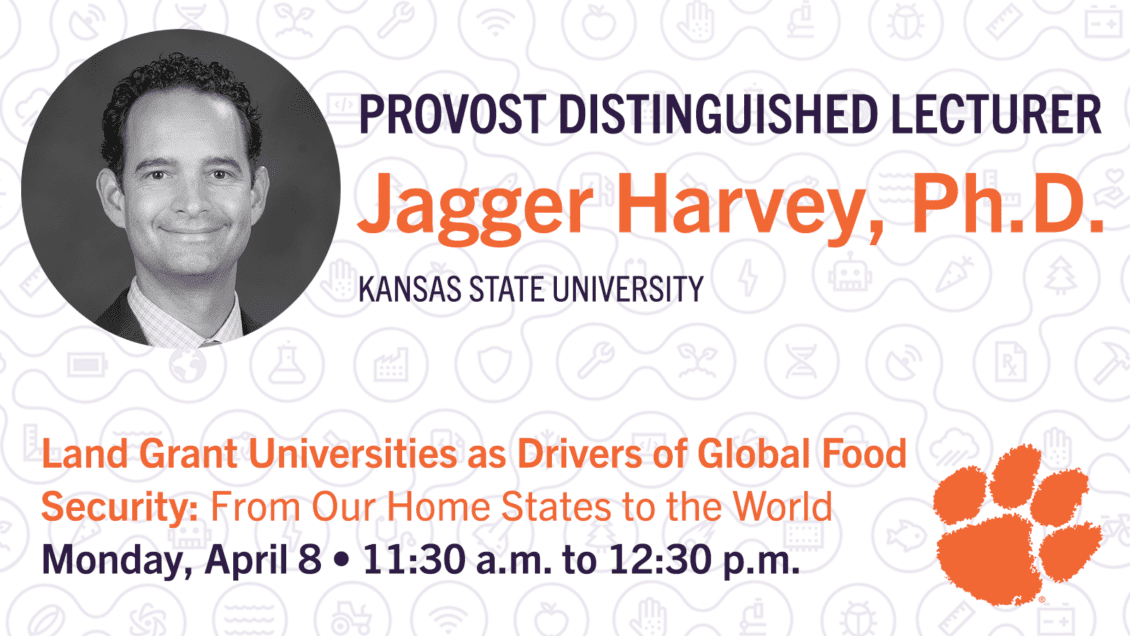
Clemson University’s Office of the Provost and the College of Agriculture Forestry and Life Sciences are proud to host Jagger Harvey as a Provost Distinguished Lecturer on Monday, April 8. Harvey is a research professor at Kansas State University in the Department of Plant Pathology and the director of Feed the Future Innovation Lab for Climate Resilient Cereals.
He will address the topic, “Land grant universities as drivers of global food security: from our home states to the world.”

Land grant universities as drivers of global food security:
from our home states to the world
Monday, April 8 | 11:30 a.m. to 12:30 p.m.
Watt Family Innovation Center Auditorium
No registration required.*
*Accommodations are available by request.
Please contact Berinthia Allison at balliso@clemson.edu
by 4:30 p.m. EST on Monday, April 1, to help ensure availability.
Land grant universities occupy a critical position in underpinning global food security efforts through research-based innovation and local capacity building. In his lecture, Harvey will address land grant universities’ critical role in international agricultural research for development, the alignment of this research with land grant universities’ core missions and its value to stakeholders in our home states. He will illustrate how this work delivers a high return on investment to reduce hunger and malnutrition, drive economic development at home and abroad and ultimately help improve national and global security.
Additionally, Harvey will highlight the new CRCIL (Climate Resilient Cereals Innovation Lab) Consortium, in which Clemson University is a key partner. The program applies cutting-edge germplasm enhancement sciences to support Bangladesh, Ethiopia and Senegal to help ensure that future cereal production is more climate resilient. The work from CRCIL and similar initiatives will likewise help bolster U.S. agriculture against future climate, pest and pathogen threats, helping drive economic development and prosperity abroad and back at home.

Harvey is passionate about catalyzing impactful partnerships to reduce global hunger and malnutrition. Having grown up in the contrasting environments of Haiti and the U.S., he saw firsthand the benefits of a food system supported by the Land Grant universities. Since 2009, he has led international agricultural research programs funded by a range of donors, with collaborative projects studying agricultural issues in more than 20 developing countries and the U.S.
Since his molecular plant pathology Ph.D. at the University of California, Davis, and postdoc at Cambridge University, his work has spanned disciplines, continents and diverse food systems. He has catalyzed and led global research collaborations across the public and private sectors that have helped address key food system challenges. He established and led a vibrant research laboratory in Kenya from 2009 to 2016 and has since directed two U.S. Agency for International Development-funded Innovation Labs led by Kansas State University: the new $22 million Feed the Future Innovation Lab for Climate Resilient Cereals, and the former Feed the Future Innovation Lab for the Reduction of Post-Harvest Loss, collectively active in seven countries.
His projects have established laboratories in Kenya, Nepal and Malawi and enhanced the capacity of many other local and national agricultural research systems.
To drive technology adoption, Harvey’s programs have engaged agricultural education and extension experts to package research findings into policy briefs, locally illustrated extension manuals and animated videos. One project in Malawi recently worked with Simon and Kendall, a music group popular with the country’s 3.1 million smallholder farming families, to release a new song and music video. The research evidence-based song and video explain the benefit of hermetic storage, a proven approach to reducing hunger and malnutrition in developing countries.



